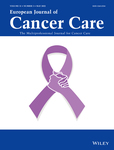Associations of self-efficacy, social support and coping strategies with health-related quality of life after radical cystectomy for bladder cancer: A cross-sectional study
Funding information: National Cancer Institute; American Cancer Society, Grant/Award Numbers: 121193-MRSG-11-103-01-CPPB, 1R03CA165768-01A1
Abstract
Objectives
Investigating associations between self-efficacy, social support and quality of life (HRQoL) and mediating effects of coping among bladder cancer (BC) patients treated with radical cystectomy (RC).
Methods
A cross-sectional study was conducted from January 2012 to December 2014 with 99 BC patients. An online survey assessed patient characteristics, HRQoL, coping strategies, self-efficacy and social support. A stepwise multiple linear regression model was used.
Results
Self-efficacy and social support were significantly associated with HRQoL. Complete mediation effects of adaptive/maladaptive coping strategies emerged for the associations between self-efficacy and social support with functional well-being (B = 0.247, 95% CI 0.119–0.374, p < 0.001; B = −0.414, 95% CI −0.526 to −0.302, p < 0.001) and total Functional Assessment of Cancer Therapy-Bladder (FACT-BI) (B = 0.779, 95% CI 0.351–1.207, p < 0.001; B = −1.969, 95% CI −2.344 to −1.594, p < 0.001). Maladaptive coping mediated the associations of self-efficacy and social support with physical well-being (B = −0.667, 95% CI −0.752 to −0.516, p < 0.001) and disease-specific symptoms (B = −0.413, 95% CI −0.521 to −0.304, p < 0.001). A partial mediation effect of adaptive coping was found for the association between self-efficacy and social well-being (B = 0.145, 95% CI 0.016–0.273, p < 0.05). Social support was significantly associated with emotional (B = 0.067, 95% CI 0.027–0.108, p < 0.001) and social well-being (B = 0.200, 95% CI 0.146–0.255, p < 0.001).
Conclusion
Interventions should tackle self-efficacy, social support and coping strategies to improve BC patients' HRQoL.
CONFLICT OF INTEREST
None.
Open Research
DATA AVAILABILITY STATEMENT
The data that support the findings of this study are available on request from the corresponding author. The data are not publicly available due to privacy or ethical restrictions.




